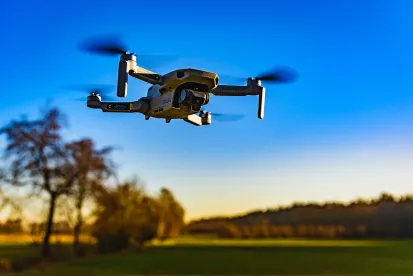The holiday season is here again, and many university students will return in January sporting a brand-new drone. Drones have come a long way from the unwieldy RC copters of the past, and modern drones can operate across several miles[1] with great precision and with mounted cameras, microphones, and other sensors.[2] However, federal and state regulators have not established a robust and uniform regulatory framework for drone operation, leaving smaller jurisdictions, including colleges and universities, to fill the gaps.
Why does my college or university need a drone policy?
The Federal Aviation Administration (FAA) regulates commercial and recreational aircraft, so universities may wonder why their campuses need to get involved. The FAA sets the floor for drone regulation, but many smaller localities have issued stricter rules. The FAA’s jurisdiction, for example, does not extend to drone-mounted cameras, so educational institutions need to address drone-enabled voyeurs with supplemental regulations.[3]
Educational institutions may also be interested in preparing students for a career in drone operations. The FAA partners with educational institutions via its UAS Collegiate Training Initiative to provide this type of instruction and connect students and universities with training materials, industry and government contacts, and other educational resources.[4] This program prepares students for safe, legal, and responsible careers in drone operation. An institution planning to take advantage of this program must have the infrastructure to support safe and practical instruction.
What should a drone policy include?
University drone policies should adequately address the three types of operators flying on college campuses: commercial, recreational, and educational or classroom/research operators. Universities may want to consider vesting drone policy and enforcement responsibility in a single position.
Commercial Operation
Universities may employ commercial drone operators to film at sporting events and graduation ceremonies, complete land surveys, and inspect buildings and other structures for damage, to name just a few applications. Accordingly, they may want to consider the processes for requesting a license to operate a commercial drone on campus and whether the university should require standard terms around indemnity and limitation of liability. An effective commercial drone policy should also answer questions such as: What is the process for requesting a commercial drone permit? Where and when is the drone permitted to fly? Are student organizations allowed to contract commercial drone operators, or do all requests need to come from university staff? Who needs to be notified if a commercial drone is used on campus, particularly near sensitive locations such as residential halls?
Recreational Operation
Along with safety considerations, it is possible that some drone use could violate certain legal obligations. For example, are students allowed to fly recreational drones over stadiums during sporting events, or could this violate an exclusivity clause with a film crew using a drone for aerial shots? If a university decides to permit recreational drone operation, it should consider where and when these activities are permitted to occur.
Additionally, drone policies should require compliance with FAA regulations for recreational operators. The FAA requires all recreational drone operators to pass an aviation safety certification called, The Recreational UAS Safety Test, or TRUST, and recreational operators must register their drones with the FAA Drone Zone, too. The FAA does not currently require recreational drones to have Remote ID capabilities.[5] (Remote ID is a signal that commercial drones broadcast to identify ownership and share telemetric data with other drones to avoid collisions.) However, the FAA will begin requiring this technology in recreational drones on September 16, 2023, so universities should update their drone policies accordingly.
Educational Operation
Even if an institution is not a member of the UAS Collegiate Training Initiative, it may still want to establish a policy for drone use in classrooms and research settings. Consider the permitting process for educational drones – should the process be different than recreational permitting? Does the university provide drones for classroom use? Are students allowed to use personal drones for classroom activities? Could the operation of a drone pose safety issues on campus? How do you mitigate those risks and restrict the use of drones without hindering the use?
Every campus is unique, so each college or university should draft drone policies that meet its specific needs. Urban campuses may face different local regulations than rural campuses; technical and research universities may need to test-fly prototype devices; film schools may want to provide the necessary instruction in drone camera operation. Now is the time to create these policies and infrastructure to allow for safe and educational use of drones on your campus.
ENDNOTES
-
https://www.droneblog.com/how-far-can-a-drone-fly-from-the-controller/
-
https://www.mtu.edu/mtri/research/project-areas/transportation/sensors-platforms/uav-deployed-sensors/
-
https://www.ncsl.org/research/transportation/current-unmanned-aircraft-state-law-landscape.aspx
-
https://www.faa.gov/uas/educational_users/collegiate_training_initiative
-
Id.



 />i
/>i

